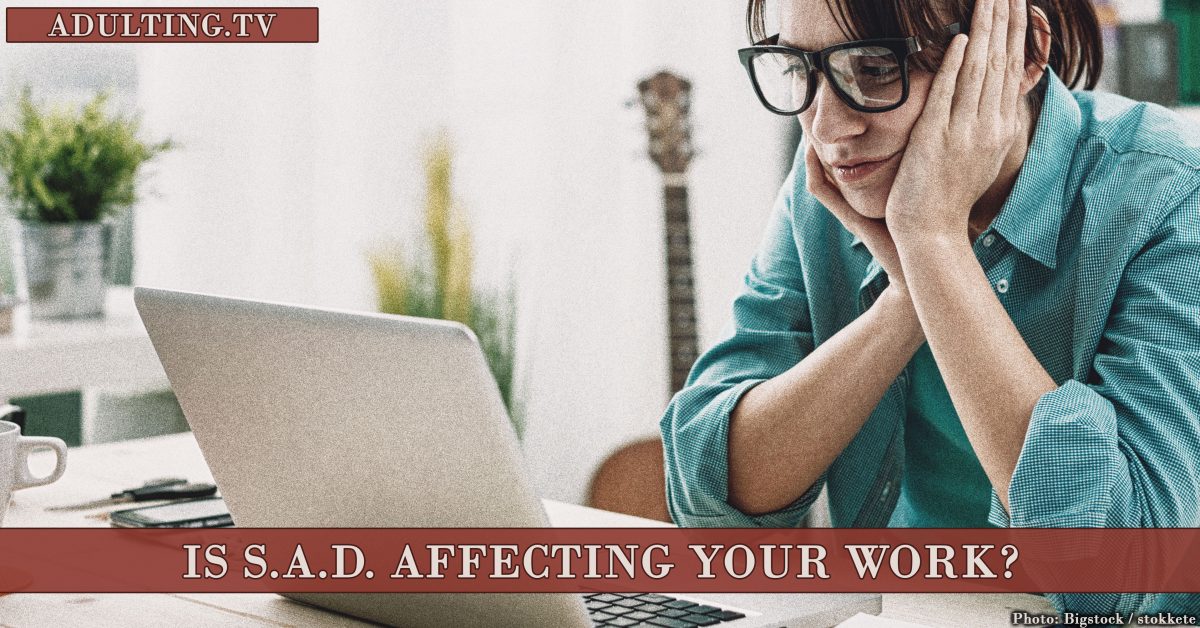It’s been pretty dreary around here lately.
It’s been cold and cloudy. We went a whole week without seeing the sun.
Maybe you’re in the same boat. Maybe you feel stressed, anxious, and down for no reason that you can put your finger on. Or perhaps you think it might be because of gloomy weather and the fact that it’s so dark for so much of the day still.
Those feelings you feel are real. It’s called Seasonal Affective Disorder (SAD). Yep. It’s a Thing. And it could be dragging you down at work and in other areas of your life.
Here’s what you need to know with SAD affecting your work:
What is SAD?
Seasonal Affective Disorder is a type of depression that comes out as the seasons change. It can result in feelings of anxiety, stress, and depression during fall and winter.
The days are shorter, and the weather often means that the sun is hidden behind clouds.
You might feel better when spring pushes the winter away and you start seeing the sun again.
However, just because you know this seasonal depression will go away, it doesn’t mean you should just try to power through all winter.
SAD affecting your work can have consequences that go beyond just the weather and the time of year. You want to address the issue in a way that makes sense so that you maintain your job performance (and your job).
Plus there’s no reason to feel crummy four to six months of the year just because seasons.
SAD affecting your work.
Do you feel like SAD is dragging you down at work? You’re not alone.
According to Purdue, SAD costs the United States about $44 billion a year in lost productivity, sick days, and other illnesses.
Some of the ways SAD could be impacting the way you do your work include:
- Difficulty concentrating on the task at hand.
- Drop in your energy level.
- Feelings of fatigue.
- Irritability (including with your coworkers).
- Hard time motivating yourself to do your work.
This goes beyond a need to just suck it up and do the thing.
SAD can really cause problems for your productivity, and keep you from accomplishing everything you’d like to do.
Plus, when your work performance suffers and you start missing deadlines, that could mean a real problem at work.
While it would be nice if all employers were understanding and willing to help mitigate the impacts of SAD in the workplace, the fact is many of them are just going to look at your performance.
If your work performance is dropping off, if you’re missing deadlines and making a lot of unacceptable mistakes, that could be grounds for firing.
When you find SAD affecting your work, it’s time to get help.
On your own: attempts to ward off SAD yourself.
If you’re like me, you don’t want to get professional help until you’ve tried to take care of the issue on your own.
The good news is that there are some things you can do to boost your mood and chase the SAD blues away. According to WebMD, some of the things you can try on your own include:
- Regular exercise. Regular exercise is a mood-booster. You can help your energy level, help your brain, and fight against SAD with regular exercise. Bonus points if you can do at least some of your exercise outside (take a brisk walk) or near a window so you get that natural light.
- Open a window. I find myself less inclined to open windows during the winter. I’ve been fighting that, and it helps my mood. Even if the day is cloudy, that extra natural light can help.
- Melatonin. WebMD points out that some people find results from melatonin, which can help you regulate your biological clock. You do need to be careful, though, since this (and other complementary methods) can interact with current medications and have other issues.
- Pay attention to your diet. When you’re feeling SAD, it’s common to crave junk food and eat foods that aren’t the best for you. If possible, eat healthy. Plenty of fruits and vegetables, lean proteins, and whole grains can help your body function better.
- Take time for yourself. Don’t forget to relax. Take time for yourself. Meditate. You might be surprised at how good sleep, time for relaxation, and enforced meditation can help your mood.
Sometimes, though, the SAD is too strong to keep away yourself. You might actually need to seek professional help.
Common treatments for SAD.
With SAD affecting your work, it’s vital that you get professional help if attempts to fight the feeling on your own are failing.
There’s nothing wrong with getting help.
Light therapy.
One of the most common treatments for SAD is light therapy. With light therapy, you use a special bulb to provide you with more light in your day. The idea is to provide you with more exposure to light, either in the morning or in the evening (or both).
Many people with SAD improve with the help of light therapy and little else is needed beyond that.
Counseling.
Another way to get help with SAD is to get counseling. In general, I support the idea that everyone should get therapy at some point. It can be really helpful.
Counseling can help you by giving you someone to talk to. Additionally, a therapist that is well-versed in SAD and how to use cognitive-behavioral therapy to treat patients can be especially helpful.
Medication.
Finally, many people need to resort to medication to help them with SAD. For many of us, medication is an absolute last resort. However, if you need it, there’s no shame in getting a little pharmacological help.
As long as you use your antidepressants as prescribed and you remain in contact with your health care professional about your progress, it can be one way to beat SAD, especially when used in conjunction with other treatments.
Get your work back on track.
Once you understand the problem and how it impacts you, you can get your work back on track. You can keep SAD from being a detriment to your work.
It’s still a struggle some of the time, and you might fight to stay focused and motivated at work, but with the right help, it should be possible.
Do you get SAD? How does it affect your work and other areas of your life? Share your story with us in the #Adulting community on Facebook.






